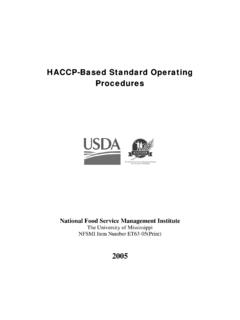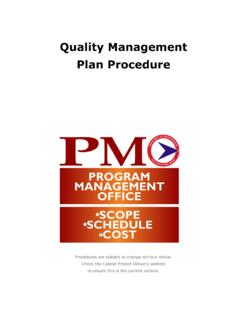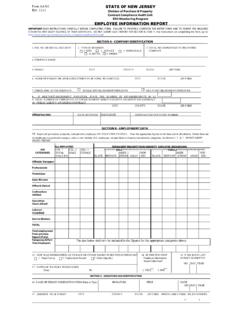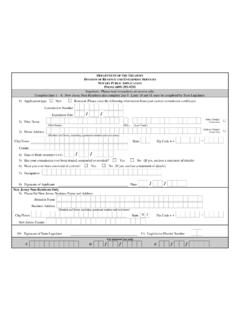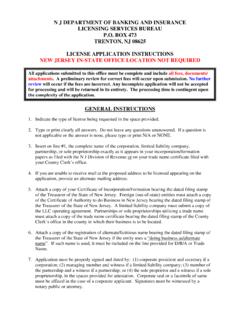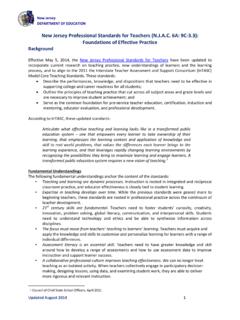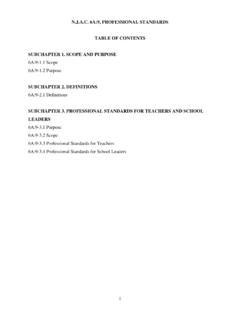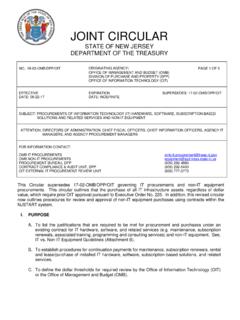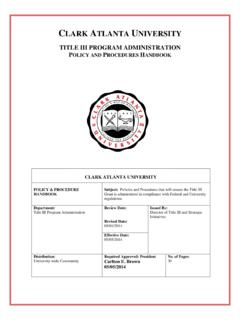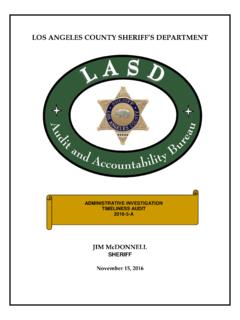Transcription of Internal Affairs Policy Procedures 2017.Final - New Jersey
1 Internal Affairs Policy & Procedures Internal Affairs Policy & Procedures . Issued August 1991. Revised November 1992. Revised November 2000. Revised September 2011. Revised July 2014. Revised November 2017*. Table of Contents Internal Affairs Policy & Procedures .. 1. Table of Contents .. 1. Introduction .. 3. Fundamentals of the Disciplinary Process .. 6. Policy Management System .. 6. Prevention of Misconduct .. 9. Responsibility for Discipline .. 10. Fitness for Duty .. 11. Internal Affairs Unit .. 12. Duties and Responsibilities .. 12. Selection of Personnel for the Internal Affairs Unit .. 13. Accepting Reports of Officer Misconduct .. 14. Accepting Reports Alleging Officer Misconduct .. 14. Immediate Suspension Pending Investigation and Disposition .. 16. Investigation of Internal Complaints .. 18. Time Limitations .. 18. Investigation and Adjudication of Minor Complaints.
2 19. Investigation and Adjudication of Serious Complaints .. 20. Domestic Violence Incidents Involving Agency Personnel .. 23. Internal Affairs Investigation Procedures .. 24. Interviewing the Complainant and Civilian Witnesses .. 24. Reports, Records and Other Documents .. 25. Physical Evidence .. 25. Photographs .. 25. Physical Tests .. 26. Drug Testing .. 26. Polygraph .. 27. Search and Seizure .. 27. Electronic Surveillance .. 29. Lineups .. 30. Investigation of Firearm Discharges .. 30. Collateral Issues .. 31. 1 11/2017. * These revisions incorporate the modifications concerning mandatory notification to complainants set forth in Attorney General Law Enforcement Directive No. 2017-2. Internal Affairs Policy & Procedures Interviewing Members of the Department .. 32. General Background .. 32. Criminal Investigation, Officer Is Subject .. 35. Criminal Investigation, Officer Is Witness.
3 36. Administrative Investigation, Officer Is Subject .. 36. Administrative Investigation, Officer Is Witness .. 38. Interviewing Procedures .. 38. Internal Affairs Records .. 40. The Internal Affairs Report .. 40. Internal Affairs Records .. 40. Retention Schedule .. 41. Confidentiality .. 42. Reporting .. 43. Personnel Records .. 45. Risk Management Procedures .. 46. 2 11/2017. Internal Affairs Policy & Procedures Introduction Internal Affairs Policy & Procedures was first published in 1991. Updates to the Policy were issued in 1992, 2000 and 2011. The purpose of the Policy is to assist the State's law enforcement agencies with investigating and resolving complaints of police misconduct that originate with private citizens or are generated by the supervisors, officers or employees of a law enforcement agency. The goals of the Policy are to enhance the integrity of the State's law enforcement agencies, improve the delivery of police services and assure the citizens of New Jersey that complaints of police misconduct are properly addressed.
4 This Policy can also be more broadly applied to non-law enforcement employees. See DCJ 11. (currently being revised to apply to all Department of Law and Public Safety employees). Since the introduction of the Policy , the process we call " Internal Affairs " has come under increasing scrutiny by the courts, the community and the media. In fact, it would be fair to say that the proper administration of the Internal Affairs function by the State's law enforcement agencies is a critical issue for the criminal justice system in New Jersey today. The New Jersey Legislature recognized the importance of the Internal Affairs function in 1996 with the enactment of 40A:14-181. The statute provides that: Every law enforcement agency shall adopt and implement guidelines which shall be consistent with the guidelines governing the " Internal Affairs Policy and Procedures " of the Police Management Manual promulgated by the Police Bureau of the Division of Criminal Justice in the Department of Law and Public Safety, and shall be consistent with any tenure or civil service laws, and shall not supersede any existing contractual agreements.
5 In addition, the courts, particularly the federal courts, have focused on the importance of the Internal Affairs function. They have come to perceive this function as an important means of protecting the constitutional rights and civil liberties of the state's citizens. Under the case law, law enforcement agencies must do three things under the Internal Affairs function. First, agencies must implement an Internal Affairs Policy that provides for a meaningful and objective investigation of citizen complaints of police misconduct. Second, agencies must monitor and track the behavior of police officers for incidents of misconduct. Third, when officers are found to have engaged in misconduct, agencies must correct the behavior. The courts have with increasing frequency issued decisions that set minimum standards of performance for the Internal Affairs function. In view of these developments, the Attorney General has issued, through the Division of Criminal Justice, this revised and updated version of Internal Affairs Policy & Procedures .
6 The revisions attempt to incorporate and reflect the numerous changes that have occurred in l a w enforcement and the Internal Affairs function since the Policy was first issued in 1991. The revised Policy is also designed to assist law enforcement agencies in their efforts to comply with emerging legal principles governing the Internal Affairs function. It is important for county and municipal law enforcement agencies to recognize that, as they conduct Internal Affairs investigations, they do so under the general supervision of the Attorney General. The Criminal Justice Act of 1970 designates the Attorney General as the State's chief law enforcement officer. ( 52:17B-98). As such, the Attorney General is responsible for the general supervision of the State's law enforcement agencies to provide for the efficient administration of the criminal justice system. Subordinate law enforcement agencies, including county and municipal police forces, have a duty to cooperate with the 3 11/2017.
7 Internal Affairs Policy & Procedures Attorney General to improve the administration of the criminal justice system, including the efficient delivery of police services. For county and municipal law enforcement agencies, cooperation in Internal Affairs matters begins with strict adherence to the Attorney General's Policy requirements. County and municipal law enforcement agencies must also recognize that they conduct Internal Affairs investigations, particularly those that involve allegations of criminal conduct, under the direct supervision of the county prosecutors. County and municipal law enforcement agencies must inform the appropriate county prosecutor when allegations of police misconduct involve potential criminal conduct. In addition, county and municipal law enforcement agencies must confer with and follow the instructions given by the county prosecutor at all critical points in the investigative process.
8 This is particularly true when the agency is in the process of gathering evidence, including the taking of statements, concerning allegations of criminal conduct. The revised Policy contains several mandates that, at the Attorney General's direction, every law enforcement agency must implement. However, the manner in which these agencies must implement these mandates is a decision that is left to the individual law enforcement agency's discretion. For instance, every agency must establish an Internal Affairs function. But the manner in which the mandate is satisfied is a decision left to the discretion of the individual agencies. Individual agencies shall decide, based on the characteristics of their jurisdiction and the workload of their agency, whether the Internal Affairs function is a full- or part-time unit and how many officers are assigned to work in that unit. Other Policy requirements that the Attorney General has determined are critical and must be implemented by every law enforcement agency include the following: Each agency must establish by written Policy an Internal Affairs function.
9 Each agency must accept reports of officer misconduct from any person, including anonymous sources, at any time. Where a preliminary investigation indicates the possibility of a criminal act on the part of the subject officer, the county prosecutor must be notified immediately. No further action should be taken, including the filing of charges against the officer, until the county prosecutor so directs. The agency must notify the county prosecutor immediately of any use of force by an officer that results in death or serious bodily injury. Each agency must thoroughly and objectively investigate all allegations against its officers. Each agency must notify its officers of complaints and their outcomes. Each agency must notify complainants of the outcome of their complaint. Each agency must establish and maintain an Internal Affairs records system which, at a minimum, will consist of an Internal Affairs index system and a filing system for all documents and records.
10 In addition, each agency shall establish a protocol for monitoring and tracking the conduct of all officers. 4 11/2017. Internal Affairs Policy & Procedures Each agency must submit quarterly reports to the county prosecutor summarizing the allegations received and the investigations concluded for that period. Each county prosecutor shall establish a schedule for the submission of the reports and specify the content of the reports. Each agency must annually release reports to the public summarizing the allegations received and the investigations concluded for that period. These reports shall not contain the identities of officers or complainants. In addition, each agency shall periodically release a brief synopsis of all complaints where a fine or suspension of 10 days or more was assessed to an agency member. The synopsis shall not contain the identities of the officers or complainants.

